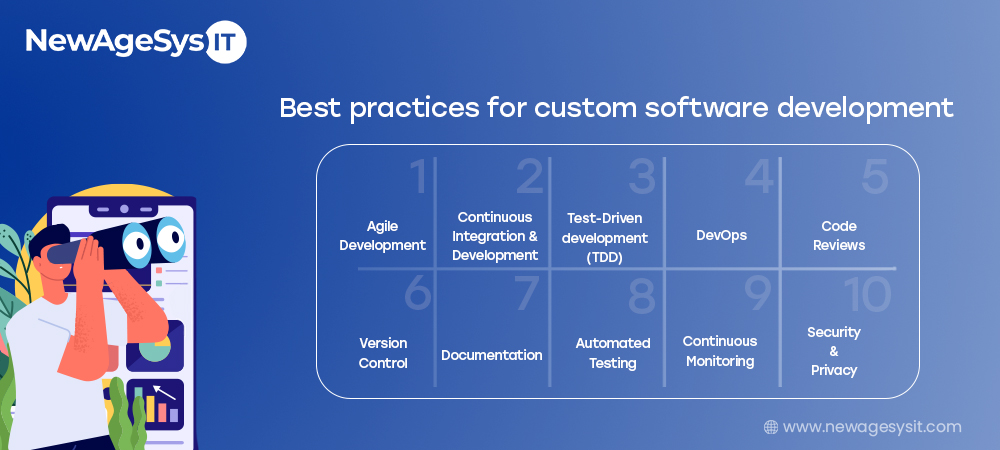Does your business rely on software solutions, or perhaps not? The fact remains that the right software is important to any business, but for firms that are keen to find ways of increasing their efficiency and growth, investing in smart technology makes the most sense.
But where should you begin?
It all starts with custom software development. You get your custom software created based on the requirements of your business. But most importantly, whether you are a new startup or already an established company, using the appropriate software can change how you operate and interact with customers.
Well, we know you are interested in learning more about this, and we did it for you. This guide on Custom Software Development explores its advantages, usage, and very best practices to create scalable and secure solutions based on your unique needs.
What is Custom Software Development?
Custom software development simply means developing applications or systems that are specially designed for particular needs in a business or organization. They assist organizations and businesses in automating processes, optimizing workflows, and providing custom-made experiences tailored to the needs of a business.
Here, the software is developed based on the client’s requirements. It may take in features, functionalities, and integrations that may serve their business needs or purpose. In the custom development of the software, businesses can wholly retain the functionality and design and the user experience of the software.
It is a complex process requiring knowledge of multiple technologies and including multiple steps. Instead of hiring a workforce possessing these capabilities, companies normally work with custom software development companies that already have a highly skilled workforce. At NewAgeSysIT, we are the leading custom application development company offering custom software development services for businesses of all sizes.
The market for custom software development was valued at USD 35.42 billion globally in 2023, and it is anticipated to expand at a compound annual growth rate (CAGR) of 22.5% between 2024 and 2030.
Advantages of Custom Software Development
Tailored Solutions
The greatest benefit of custom software development is that it allows for a tailored approach to meeting unique needs. It is designed and developed to fit into the specific requirements of an organization or business. This tailored or customized method ensures that the software aligns precisely with the organization’s processes, goals, and user expectations. As a result, this enables businesses to streamline operations and achieve maximum productivity.
Scalability
We all know that business needs can grow over time. The best part is that as the business grows with evolving requirements and needs, custom software can be easily scaled up to accommodate increased data volumes, user traffic, and additional features. This scalability guarantees that the software can continue to manage the expanding needs of the company without requiring significant system changes or the implementation of new applications.
Enhances efficiency and productivity.
Since it is tailoring the software to specific workflows, it is always better to focus on the basic functionalities and remove unnecessary features that don’t add to the core of things. The outcome of this is that it streamlines processes, cutting down on human labor, and automating repetitive jobs, resulting in improved efficiency and productivity. Proper custom software development enables businesses to make the most out of their productivity and get much more using fewer resources.
Integration
Custom software can be easily connected with databases, third-party apps, and current systems that a business depends on. This integration capability makes sure that data is exchanged smoothly, removes the need for manual data entry, and optimizes operations between different departments or activities. Businesses can increase overall operational efficiency, collaborate better, and achieve better data consistency by integrating custom software with their current infrastructure.
Ownership and Control
It is great if we have full control right? Custom software development services give businesses absolute ownership and control over the source code and the software ecosystem. This ownership can enable the firms to alter and modify their products better to meet the requirements of the businesses, and that helps in making quick adaptations in response to changes in market conditions and customer needs. When compared to off-the-shelf software, customized software gives the business total control over the development of the software. This way, it can evolve according to what the business needs at a particular moment.
Long-Term Cost Savings
Even though custom software development may be more expensive initially than off-the-shelf options, it saves a lot of money over time. The continuous licensing costs connected with commercial software solutions are eliminated with custom software. Additionally, it lessens the necessity for buying extra software or creating workarounds to meet particular needs. In the long run, custom software is cheaper for organizations or businesses because its overall cost tends to be lower.
From 2024 to 2030, the U.S. market for custom software development is expected to increase at a compound annual growth rate (CAGR) of 18.5%.
Common Use Cases of Custom Software Development
Enterprise Resource Planning (ERP) systems
- Custom ERP systems help organizations manage and plan their everyday operations that bear on their day-to-day work by linking many business functions, like finance, HR, and inventory management, to the software.
Customer Relationship Management (CRM) systems
- The individual client interactions, along with their behavior tracking and personalization, will be taken care of by CRM systems.
E-commerce platforms
- Using custom ecommerce platforms, businesses can sell their products online and track orders, manage inventory, and process payments, among other things.
Mobile applications
- Custom mobile apps can be created for several uses, including customer interaction, efficiency, and education.
Business process automation
- Routine business procedures can be automated with custom development, saving time and effort compared to manual tasks.
Data management and analysis
- In addition, custom software can gather, store, and analyze data, helping businesses make the correct decisions.
Supply chain management
- The development of custom software applications can produce solutions for managing the movement of products and services throughout the supply chain, streamlining operations, and cutting expenses.
Healthcare management
- Healthcare practitioners could track information about patients and prescriptions and monitor their patient’s health by making use of custom software.
Education and training
- Software product development can be developed for educational institutes to maintain student records, track grades, and deliver training materials.
Besides, any services in industries and applications are possible. Custom software development provides solutions outside the previously mentioned. With a trusted custom software development team, the business can develop software that is effective and safe as well as suitable for its needs.
Best Practices for Custom Software Development
Agile Development
Agile Methodology, you heard this from many software companies, right? One of the best practices in software development is this. However, with an Agile approach, whether Scrum or Kanban, it encourages flexibility, teamwork, and iterative development. It enables frequent releases, quicker feedback, and flexibility in response to shifting needs.
Continuous Integration and Deployment
Setting up a CI/CD pipeline automates the build, testing, and deployment procedures. This allows developers to simply combine code updates regularly, keeping the software upgraded and ready for deployment.
Test-Driven Development (TDD)
TDD entails writing automated tests before writing the actual code. This method guarantees that the product/software performs as planned, minimizes bugs, and improves overall code quality.
DevOps
Adopt the DevOps culture, which encourages collaboration across development and operations teams. This focuses on automation, continuous integration, and effective deployment for quick delivery and higher-quality software.
Code Reviews
Promoting frequent code reviews among the development team members is another excellent practice. Peer code reviews facilitate the discovery of errors, enhance the quality of the code, and foster team knowledge and expertise. They also guarantee that best practices and coding standards are followed.
Version Control
To track revisions, manage code changes, and encourage teamwork, use a dependable version control system, like Git. It gives developers the ability to work concurrently on several features and offers a way to revert to earlier versions if necessary.
Documentation
Keep a record of the key features, design choices, and software architecture. Code and system documentation that are well-documented facilitate improved software comprehension, maintenance, and future improvements.
Automated Testing
Develop a thorough automated testing plan that consists of end-to-end, integration, and unit tests. Automated tests serve as a safety net for upcoming code changes, assist find bugs early, and guarantee software reliability.
Continuous Monitoring
Regular checkups and integrations are important to any software in this current fast-paced world. Install tracking and logging tools to monitor the software’s functionality, availability, and performance. Continuous Monitoring aids in problem identification, information gathering, and proactive problem-solving.
Security and Privacy
Throughout the development phase, give security and privacy priority. Make sure that the applicable data protection laws are being followed, do routine security assessments, and adhere to secure coding practices. To protect sensitive data, put in place safeguards like encryption, access controls, and secure authentication.
Wrapping Up
You now understand that organizations have a special chance to leverage technology to gain a competitive edge through custom software development. Improved security, increased efficiency, and a customized solution that can be adapted to meet the specific needs of an organization are benefits of custom software applications, on the other hand.
The process of developing custom software is intricate and calls for knowledge of numerous technologies. For that, a lot of planning plus the right combination of skill and experience are required for the proper process to be completed.
If you are thinking about developing custom software it is imperative that you collaborate with one of the trustworthy custom software development companies that has experience in your sector. Skilled developers ensure that your software solution is built with the intent to impress your clients as well as meet particular needs.
NewAgeSysIT is a leading custom application development company having years of experience in creating unique solutions that precisely meet the business needs of its clients. We can help you maximize the value of your money because we have a team of creative, experienced, and professional software engineers. Get a free consultation now!
We hope you have enjoyed our guide on custom software development.






















